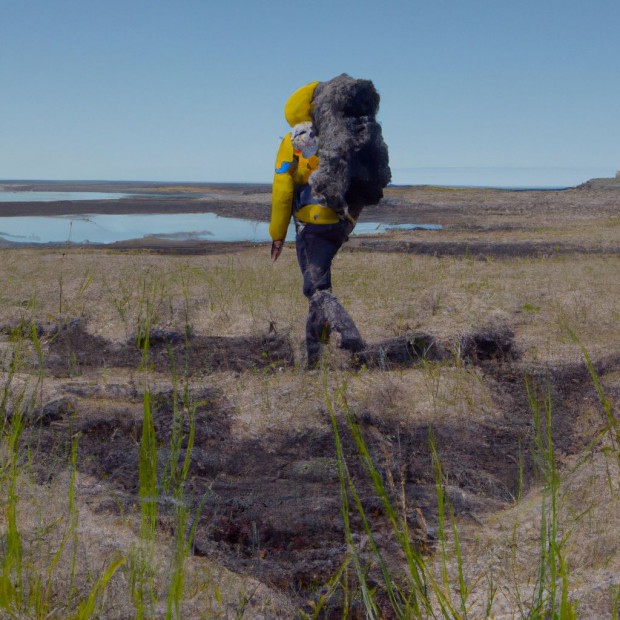
(Photo: Backpacking Safely Across Unknown Territories with GPS Trackers)
Discover the thrill of backpacking through uncharted territories with the reassurance of GPS tracking technology by your side. As an avid adventurer, you know the importance of safety and preparation while exploring new places. With the rising concern of getting lost or facing dangerous situations, having a GPS tracker is crucial for your peace of mind.
Backpacking in unfamiliar areas can be both thrilling and dangerous. The thrill of discovering new landscapes and the freedom it brings can be exhilarating. However, it is important to be aware of potential challenges such as navigation difficulties, unpredictable weather and encounters with unfamiliar wildlife.
To stay safe and informed during such expeditions, it is recommended to thoroughly research the area beforehand, pack appropriate gear, and utilize GPS trackers to know your location.
Importance of GPS Trackers in Such Adventures
GPS trackers play a crucial role in ensuring safety and enhancing the overall experience of backpacking across unknown territories. These devices provide real-time location tracking, emergency SOS features, and the ability to share location with trusted contacts, offering peace of mind and security. Additionally, GPS trackers enable adventurers to accurately navigate through challenging terrains and explore remote areas confidently.
In 2018, a group of hikers lost in the Swiss Alps was successfully located and rescued due to the signals emitted by their GPS tracking devices, highlighting the life-saving importance of this technology.
Exploring remote destinations on foot offers an unmatched sense of adventure and discovery. The allure of venturing off the beaten path lies in encountering untouched landscapes, indigenous cultures, and unique flora and fauna. Backpackers relish the freedom to forge their trails, embracing the thrill of navigating uncharted territories.
Pro-tip: Before embarking on such expeditions, acquaint yourself with local customs and environmental regulations to ensure a respectful and safe journey.
Common Challenges and Risks
Backpacking across unfamiliar terrains presents challenges like navigation difficulties due to a lack of GPS signal or network coverage, potential encounters with wild animals, and unexpected weather changes. To mitigate these risks, it is important to carry backup navigation tools such as physical maps and compasses and to learn basic survival skills.
What Are GPS Trackers and How Do They Work?
GPS trackers are devices that utilize the Global Positioning System to determine precise location information. These devices receive signals from satellites, calculate their own location, and transmit the data to a connected device or central server. They are frequently utilized in outdoor activities, such as backpacking, to navigate unfamiliar terrain and ensure safety.
Types of GPS Trackers Suitable for Backpackers (e.g., handheld devices, wearable tech, smartphone apps)
Key Features of GPS Trackers for Backpackers
-
Long battery life: Look for GPS trackers with extended battery performance to ensure they last through long backpacking trips.
-
Waterproofing: Opt for waterproof GPS trackers to withstand unpredictable weather conditions and water-related activities.
-
Emergency SOS features: Prioritize GPS devices with reliable emergency distress signal capabilities for safety in remote areas.
While trekking in the Andes, my GPS tracker's extended battery life and waterproofing were essential during a sudden downpour, and the reliable emergency SOS feature brought help swiftly when I sprained my ankle.
Why GPS Trackers Are a Backpacker's Best Friend?
GPS trackers are crucial for backpackers as they offer real-time location data, emergency assistance, and peace of mind. They not only ensure safety and aid in navigation but also allow loved ones to track your journey. Moreover, GPS trackers can come in handy when trying to locate lost or stolen gear, making them a backpacker's most trusted companion.
Pro-tip: It is always recommended to carry a backup power source for your GPS tracker to ensure uninterrupted functionality.
GPS trackers have been invaluable for backpackers in various scenarios:
-
Navigating dense forests, where traditional maps may be insufficient due to dense foliage.
-
Tracking progress in mountainous regions, ensuring hikers stay on course and can be easily located in case of emergencies.
-
Monitoring movement in remote areas, providing peace of mind for both the backpacker and their loved ones.
When exploring unfamiliar territories, it is important to consider GPS trackers as essential gear to enhance safety and provide reassurance.
Factors to Consider When Choosing a GPS Tracker (e.g., destination, duration of trip, specific activities planned)
-
Destination: Consider GPS trackers with global coverage for international travel, like the Spot Gen3.
-
Trip Duration: For extended trips, opt for trackers with long battery life, such as the Garmin inReach Mini.
-
Specific Activities: Choose rugged, waterproof trackers for outdoor activities, such as the Bivystick satellite communicator for hiking or camping.
Tips for Setting Up and Effectively Using Your GPS Tracker
-
Choose a GPS tracker with a long battery life and real-time tracking features.
-
Set up the tracker by following the manufacturer's instructions for activation and pairing with your device.
-
Configure the tracking intervals based on the duration of your journey and the cellular coverage in the area.
-
Ensure that the tracker is fully charged and securely attached to your backpack.
-
Regularly check the signal and battery status of the tracker during your trip.
Strategies for Conserving Battery Life and Ensuring Continuous Tracking
-
Adjust tracking frequency: Increase the interval between location pings to conserve battery.
-
Carry power banks: Ensure continuous charging by carrying portable power banks.
-
Optimize settings: Turn on power-saving mode and reduce screen brightness.
To conserve battery life and maintain continuous tracking while backpacking in remote areas, consider implementing these strategies to prolong the usage of your GPS tracker.
This article is copyrighted by Travelers Today, the travel news leader
* This is a contributed article and this content does not necessarily represent the views of travelerstoday.com



